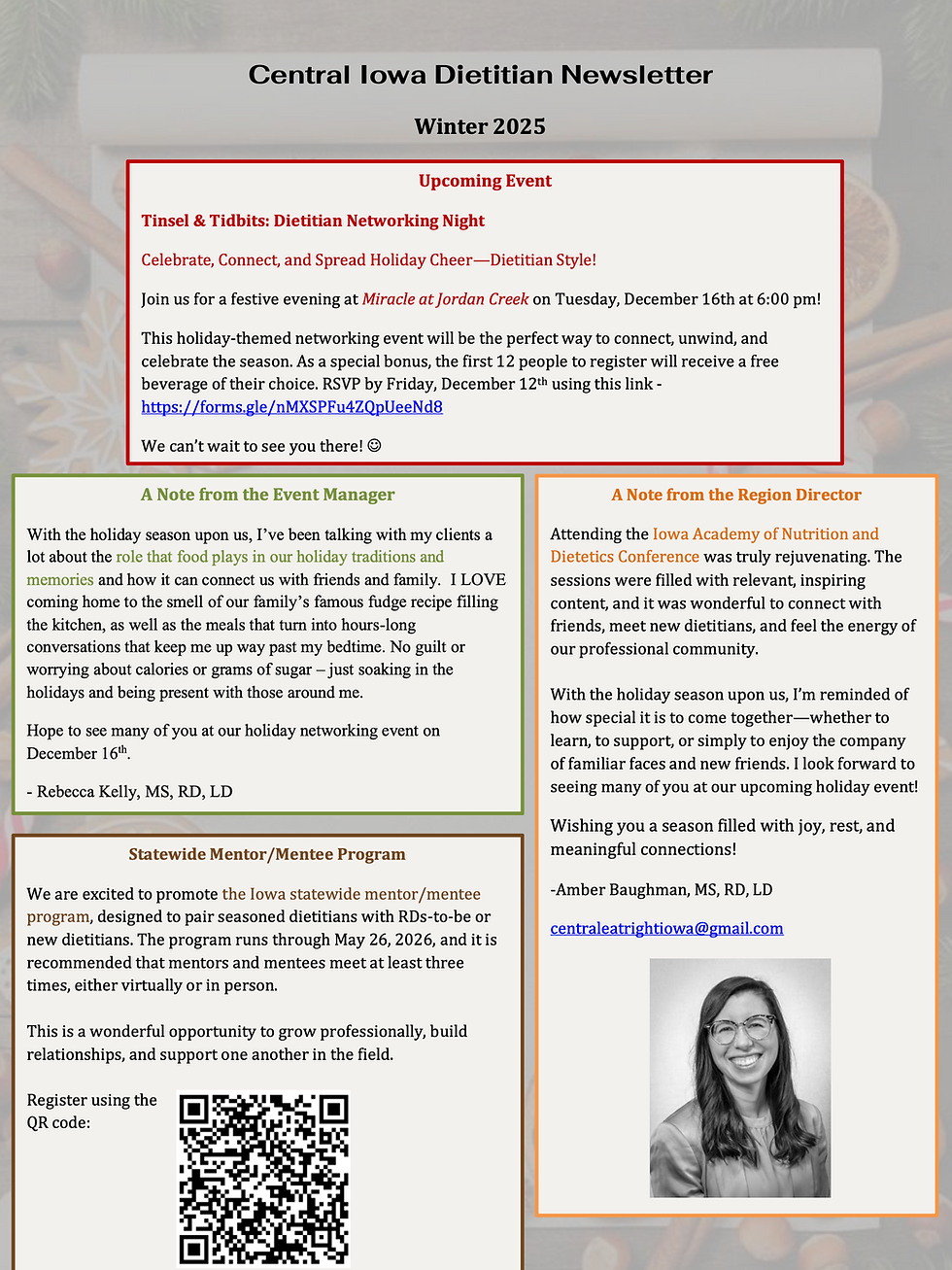Confusion on Gluten
- eatrightiowa
- Dec 2, 2019
- 3 min read
At every grocery store and supermarket, you see food items being highlighted and advertised as “gluten free.” Producers use this tactic to get consumers to assume that gluten-free products are healthier, therefore buying their product. The combination of research studies, marketing, and fad dieting leaves the typical consumer confused, possibly not even knowing what gluten might be. Gluten is a mixture of proteins including the main two of gliadin and glutenin. Gluten is often found in wheat products such as bread, crackers, and cakes, which usually gives elasticity in the dough and a desirable texture. The past few years, the gluten free diet has received so much attention, but along with that comes many misconceptions.
The gluten free diet has become very popular due to gluten being associated with more unhealthy foods. Consumers believe that by eliminating products with gluten, they will become healthier and lose weight. This leads to buying gluten-free bread, crackers, and other baked goods. Most gluten-free products tend to use more sugar and fat to replace the texture that is lost due to there being the lack of gluten. Many consumers tend to be frustrated when they do not see results by consuming the same products, just gluten-free. Producers marketing leads the consumer to think that the gluten is what is causing weight gain.

While a gluten free diet is very trendy, some people’s genetic makeup makes them very ill when consuming gluten. The gluten-free diet was originally created because people with Celiac Disease cannot consume gluten throughout their entire lifetime. Celiac Disease is an autoimmune disease in which the intestines become inflamed when gluten is consumed. The human body has microvilli to absorb nutrients with lots of surface area. People with Celiac Disease have flattened out vili, which makes it very difficult to absorb nutrients and maintain a healthy body weight. Some symptoms of Celiac include rapid weight loss, lack of iron in blood, bloating, fatigue, diarrhea, and constipation. Some people can have silent Celiac, which means that they have no symptoms, but can still damage their intestines by consuming gluten. It is important that if you are experiencing these symptoms or have a genetic history of Celiac, you see a doctor to get screened. Some serious consequences of Celiacs consuming gluten include anemia, osteoporosis, dermatitis, and infertility.
Many people think they might have Celiac Disease due to discomfort and pain in their intestinal are when consuming products with gluten. While only 1 out of every 100 people have Celiac Disease, 6 out of every 100 people have a gluten sensitivity. Gluten sensitivity causes discomfort in the intestines, but is not an autoimmune disease like Celiac. With Celiac, it is a very strict no gluten diet, including using separate cooking utensils because even the slightest amount of gluten and cause inflammation. Gluten sensitivity just indicates that you have a difficult time digesting foods with gluten in it, but it does not cause serious complications like Celiac would.
I never realized the serious complications and little education I had on the disease until I did more research. A lot of misconceptions about people with Celiac are associated with trying to be healthier, but in reality consuming gluten can cause them serious health issues. It is very important for the public and restaurants to take educate themselves because consumers can get hurt from improper cleansing and cooking techniques.

A few years ago, I thought I had Celiac Disease as I was feeling the discomfort and fatigue described in the symptoms. I saw my doctor and took a blood test, with no signs of inflammation in my intestines. This made me confused as every time I ate things with gluten, I would feel ill. While I am not a Celiac, I find that consuming things without gluten help me feel better physically. Many people contemplate going gluten-free, but there is no one diet and lifestyle that works for everyone. It is important to make your plate full of things that make your mind and body feel good, whether you are Celiac or not. Each body is different in some aspects, so think about that the next time you go to the grocery store or eat at a restaurant.












Comments